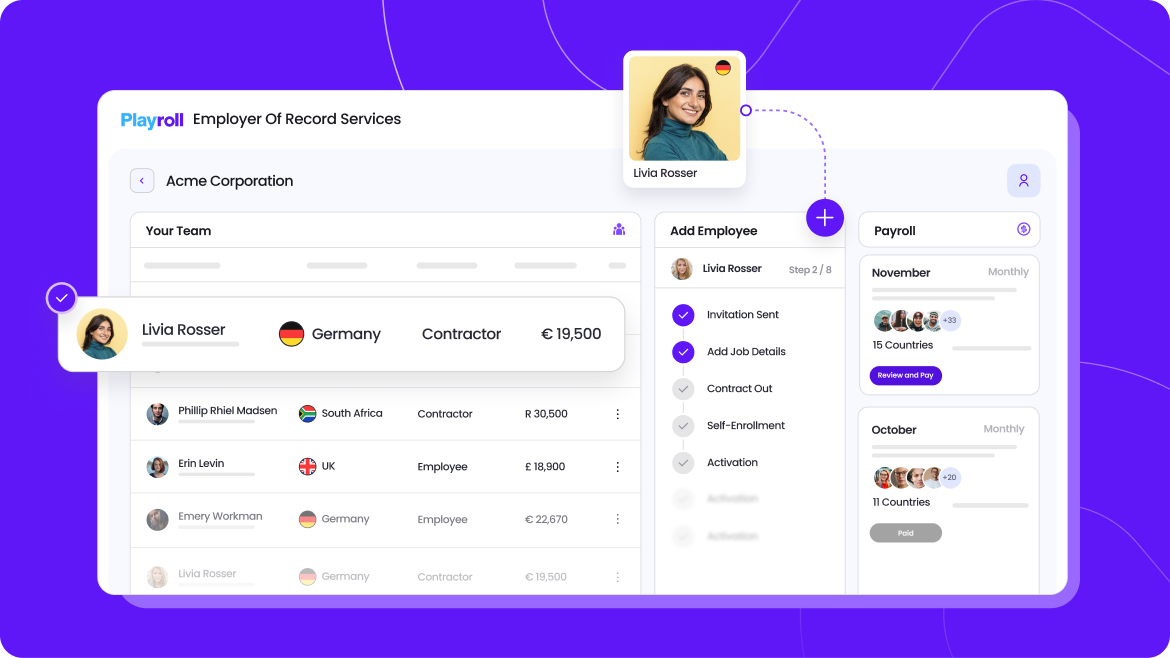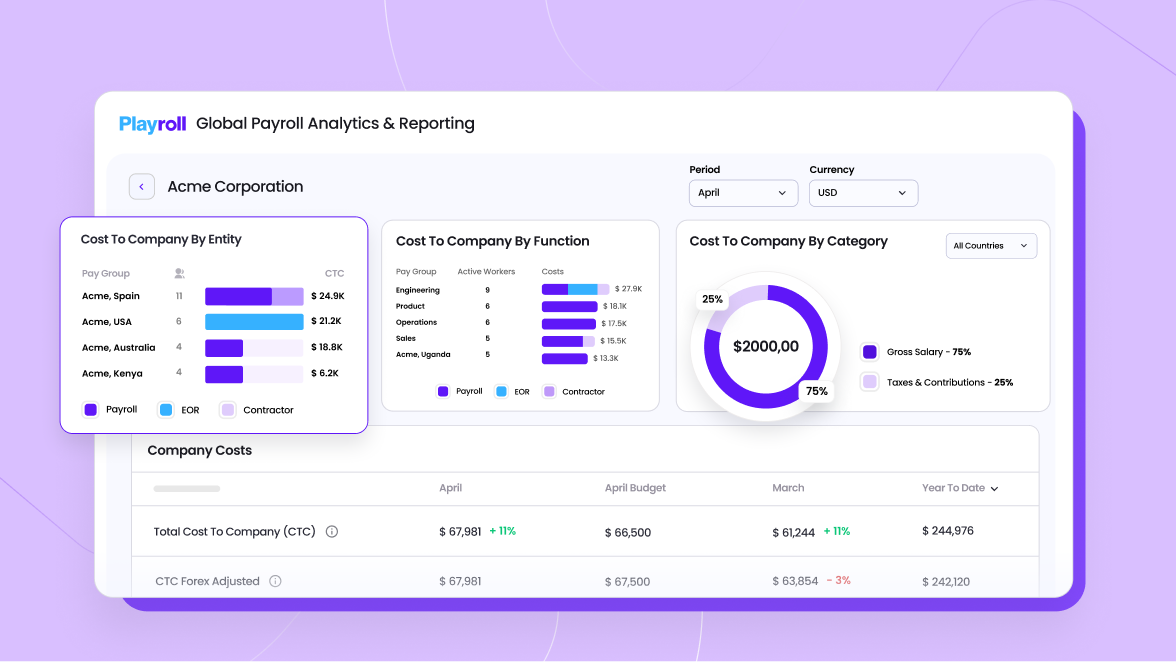Copied to Clipboard
Ready to get Started?


Key Takeaways
Partnering with an EOR lets companies enter new markets in days instead of months, making it possible to test opportunities without committing to costly entity setup.
With labor laws and benefits requirements changing regularly across jurisdictions, an EOR reduces risk by acting as the legal employer and keeping payroll and contracts in line with local rules.
Getting payroll right is just the start — great benefits, cultural fit, and a smooth onboarding experience are what keep teams engaged and global growth on track.
Scaling globally is exciting, but messy. You’re juggling market research, product localization, local partnerships, talent pipelines, contracts, payroll, tax rules, and EOR compliance risks. For many founders and HR professionals, the friction of managing all that can slow your momentum. Luckily, there are a couple of ways to ease this friction – one of them being partnering with an Employer of Record (EOR).
The EOR market is expected to expand from $6.9 billion in 2025 to $12 billion by 2030. That growth is evidence that more companies are choosing to outsource their global payroll and compliance functions, rather than building them from scratch.
Why? Because outsourcing your hiring and employment obligations to a trusted partner means you move faster, reduce risk, simplify operations – and free your team to focus on the mission instead of paperwork.
This guide walks through the 7 key benefits of using an Employer of Record service. They’ll give you the kind of insights you can share with your team in a founders’ meeting, an HR brainstorm, or a team-level pitch.
What are the Key Benefits Of Working With an Employer of Record Compared to Setting Up Entities Abroad?
When you decide to take your company global, you’ll likely find yourself deciding between two ways of going about it. Either you go at it alone and set up your own entity, or you partner with an EOR.
Each route naturally comes with its own advantages and trade-offs depending on the stage of expansion, your available resources, and your goals. Let’s get into the details of what each option looks like.
Path A: Setting Up Your Own Entity
This is the “do-it-yourself” approach. You and your company will open an entity in each new country, register with local authorities, and build your own HR and compliance infrastructure. This comes with more direct control of the market entry logistics, but it also means you take on a lot of risk.
Pros:
- Full Control: You own the entity thus have complete ownership over all processes, including any and all associated HR/finance processes.
- Long-Term Investment: Setting up your own entity makes sense if you’re building large, permanent teams in a single country.
- Brand Presence: Having a legal entity can signal stability to local partners, regulators, and candidates. A legal entity can show that you’re serious about the market you’re moving into and that you have the funding needed to make a real go of it.
- Customization: You can design your own benefits packages, policies, and employment structures without having to confer with a third party.
Cons:
- Time Intensive: Entity setup can take anywhere between 2 and 12 months and requires legal, tax, and administrative approvals. Plus, if you’re doing it for the first time, you’re at risk of making very costly compliance mistakes.
- High Upfront Cost: Registration fees, ongoing compliance, local HR hires, and legal counsel add up quickly. On average, you’re looking at paying between $15,000-20,000 to set up an entity in a new market. Add any costs you didn’t account for and penalties on top of that and the first year could reach well over $65,000.
- Complex Compliance: You’ll need in-house or external experts to track local employment laws, benefits mandates, and tax filing obligations for each new market you enter.
- Reduced Agility: Pivoting out of a market or scaling back is cumbersome once infrastructure is in place. It can take you between 6 and 12 months to close your entity if everything goes smoothly. If there are complications, however, then you're realistically looking at 12 to 24 months to exit.
Path B: Partnering with an Employer of Record
Here, you skip incorporation altogether. The EOR becomes the legal employer on your behalf, while you retain day-to-day control over roles, responsibilities, and company culture.
Pros:
- Speed to Market: Because an EOR has a network of local entities set up already, you can start hiring in days or weeks in new markets, bypassing entity registration delays.
- Lower Risk: The EOR carries liability for compliance risks, payroll accuracy, and benefits administration.
- Cost Effective: With a set, monthly fee, you avoid the overheads of building local HR, payroll, and legal infrastructure yourself. This keeps your costs low, simple, and most importantly predictable.
- Flexibility: An EOR is a great way to dip your toes in new international waters without taking on unnecessary risk. You can test new markets with a few hires before committing to a full scale-up or you can easily pivot your strategy and quickly exit the market if you need to.
- Focus on Growth: With the EOR handling the admin and compliance burden, your internal team can prioritize customers, product, and expansion.
Cons:
- Less Direct Control: Employment contracts, payroll, and benefits run through the EOR, not your own entity.
- Transition Complexity: Moving employees from an EOR to your own entity later can involve contract transfers and benefit resets.
- Potential Hidden Fees: Some providers add markups on benefits, currency conversions, or offboarding services. Make sure that you know exactly what you’re getting into with a partner before signing any contracts.
Main Benefits of Using an Employer of Record for a Growing Company
With an increasingly globalized marketplace, it’s both easier and more necessary than ever for your business to have a global presence. Leaning into this shifting landscape with EOR services means you’ll reach your HR operations and revenue KPIs faster than anticipated, plus you’ll be doing it all with a much lower cost.
Here are our top seven, often-overlooked, benefits of using an Employer of Record service can help you gain an edge over competitors and become a global contender in your industry.
1. They Remove the Legal Barriers
Expanding into a new country almost always means you’ll need people on the ground – whether it’s customer support staff, local sales teams, or technical specialists who understand the market. The catch? Hiring those people usually requires setting up a legal entity in that country first, and that process can take months.
An EOR removes that barrier. Instead of waiting on government approvals, registration filings, and bank accounts, the EOR becomes the legal employer on your behalf. They already have the entity structure in place, which means you can start sourcing talent immediately.
In practice, this means:
- You can hire in days or weeks rather than months.
- You avoid complex and expensive entity set up processes.
- You stay compliant with local labor laws without needing to become an expert overnight.
For businesses eager to test a new market, this speed can be the difference between being first to capture an opportunity and watching a competitor get there before you.
2. They Manage Compliance For You
Every country comes with its own web of local employment laws, mandatory benefits, tax rules, and reporting deadlines. Even one misstep – like failing to provide a statutory benefit or filing payroll taxes late – can result in heavy fines, reputational damage, or even bans from operating in that market.
With an EOR, you don’t have to be a compliance expert in every jurisdiction. The EOR monitors local regulations, updates your contracts, and ensures payroll and benefits align with both legal requirements and local expectations.
They handle:
- Compliant onboarding & contract set up to avoid misclassification
- Offboarding and terminations
- Mandatory employee benefits (like pensions, leave, or health coverage).
By outsourcing compliance, you’re both lowering your risk and gaining peace of mind that your operations stay above board as the rules evolve.

3. They Save You Time And Money
We don’t need to tell you that running a business is time-consuming and we’ve all heard the familiar phrase “time is money” thrown around. But you and your team know the real cost of stretching your focus across innovation, operations, and international growth.
That cost multiplies when you expand into a new country – building local HR teams, hiring compliance specialists, and setting up payroll systems. That’s expensive, but it also eats up one of your scarcest resources: time.
By partnering with an EOR, you avoid both costs. Instead of spending months setting up processes and staffing back-office functions, you tap into the EOR’s ready-made infrastructure. They manage payroll, compliance, and HR operations for you, so your team can focus on strategy and growth.
With an EOR you can:
- Avoid the cost of hiring local HR, payroll, and legal staff in every country.
- Save weeks or months of setup time by using ready-made infrastructure and time your team would have spent researching local compliance laws.
- Keep your internal team focused on growth instead of admin tasks.
- Access economies of scale, like negotiated benefit rates and centralized systems.
4. They Give You Access to Global Talent
Unlike staffing agencies, an EOR becomes the legal employer, covering compliance for both employees and independent contractors. Limiting hires to the countries where you have entities means shrinking your talent pool dramatically. An EOR gives you instant access to global hiring without borders. EORs typically cover anywhere between 80 to 150+ countries with larger players like Playroll offering services in 180+ countries.
With an EOR, you can:
- Hire top talent in any country where they operate.
- Balance time zones by hiring across geographies.
- Diversify teams with local cultural insights and skills.
- Scale faster in customer markets by hiring locally.
The labor market is now reported as the tightest in two decades, with advanced economies facing structural challenges such as aging populations, shrinking working-age cohorts, and mismatches between worker skills and employer needs. These pressures make local hiring increasingly competitive and costly.
By widening your scope through global hiring, companies can tap into underutilized or emerging talent pools, offset demographic headwinds, and reduce the risks of talent shortages. EORs also ensure that whether you hire full-time employees or independent contractors, you stay compliant with local labor laws.
5. They Support Accurate, On-Time Payroll Processes
Global payroll is notoriously complex. Paying staff across multiple countries means juggling different currencies, tax rates, and deductions, often under strict deadlines. For small HR teams, this can be overwhelming and mistakes are costly.
An EOR streamlines managing payroll by consolidating everything into one system. They calculate salaries, handle deductions, remit taxes, and deliver compliant payslips on time. Many also assume liability for errors, protecting your business from penalties.
Key advantages include:
- Consistent, on-time payroll across all regions.
- Automated compliance with local tax authorities.
- Clear visibility into global payroll costs in one dashboard.

6. They Help You Create Competitive Benefits Packages
When expanding globally, payroll is only one cog in the hiring machine. When hiring today, getting employee benefits right is just as important as running accurate payroll. In many markets, benefits like healthcare, pension contributions, or paid leave are legal requirements and act as a talent magnet. Getting it wrong can damage your reputation and push top talent away.
An EOR ensures your benefits packages are both compliant and competitive. Because they work with large groups of employees across many countries, EORs often have access to better rates and broader networks than a single company could secure alone. This means your team enjoys benefits that match or exceed local standards, no matter where they are.
With an EOR you can:
- Deliver benefit packages tailored to each country’s legal and cultural expectations.
- Access group-rate health and retirement plans that lower costs for your business.
- Provide consistent experiences to employees across different markets.
- Improve retention by showing employees you care about their wellbeing and future.
7. They Grant Access To Cutting-Edge HR Platforms
As your company scales internationally, it’s tempting to build out larger HR and compliance teams to handle the extra workload. But bigger isn’t always better. Overstaffing can slow decision-making, increase costs, and create unnecessary communication chains.
By partnering with an EOR, you keep your org chart lean. Instead of hiring separate specialists for HR, payroll, compliance, and benefits, you consolidate those functions under one provider. At the same time, you gain access to the EOR’s custom HR and payroll analytics – tools built for managing global teams efficiently.
With an EOR you can:
- Avoid overstaffing by outsourcing HR, payroll, and compliance functions.
- Access automated platforms that handle payroll, deductions, and benefits across countries.
- Reduce the risk of outdated software investments by leveraging the EOR’s ongoing tech improvements.
- Keep sensitive data secure by using integrated, in-house systems instead of scattered third-party tools.
What Risks Should A Company Consider Before Choosing an EOR?
No solution is flawless and even the best Employer of Record services come with trade-offs. Before you commit, it’s important to understand the potential risks you could face and plan for them upfront. Here are the four most common challenges you might come across when choosing an EOR:
Varying Interpretations of Law
Global employment law is complex, and in many countries, regulations aren’t always clear-cut. Termination policies, classification of independent contractors, and mandatory employee benefits can all have multiple interpretations. The risk? What your EOR considers compliant might not perfectly align with how local authorities view the law.
A strong EOR minimizes this by leaning on in-country legal experts who monitor regulatory changes and offer guidance grounded in local practice. The best partners also give you transparency into how they interpret gray areas – so you can make informed choices about your level of risk tolerance.
Hidden Costs
At first glance, EOR pricing looks straightforward: a flat monthly fee per employee. But dig deeper, and you may uncover hidden costs like currency conversion markups, benefit administration surcharges, or exit fees when offboarding employees. These charges can add up quickly and undercut your ROI.
The best EORs are cost effective and transparent about costs from the get-go. They’ll provide a full breakdown of what’s included and clarify which services may incur additional charges. This allows you to budget confidently and avoid unpleasant surprises later.
When evaluating providers, make sure to:
- Request detailed sample invoices.
- Ask how they handle exchange rates and benefit markups.
- Clarify any penalties for offboarding or transitioning employees.
Company Culture Dilution
One of the biggest concerns about using an EOR is that it might erode the company culture you and your team have worked so hard to build. After all, if employees technically report to an external “legal employer,” won’t that distance them from your brand?
The reality is that culture isn’t built in contracts or legal agreements, it’s built in experiences. An EOR may handle payroll, compliance, and HR admin, but your company still shapes how employees engage day to day. The onboarding experience, team communication, leadership visibility, and recognition programs for example, are what build great workplace culture.
Forward-thinking EORs even support this process by:
- Enabling branded or white-label onboarding workflows or templates.
- Offering integrations with your internal communication and training platforms.
- Providing local HR guidance so your policies align with cultural expectations.
Rather than diluting culture, the right EOR can help strengthen it by removing admin barriers so you can focus on building authentic connections across borders.
Transition Risk
For many companies, an EOR is a stepping stone. You may start with an EOR to test a market, then decide to establish your own local entity once headcount scales. However, transitioning employees from an EOR contract to your direct payroll can be complicated.
Issues that often occur:
- Rewriting contracts in line with local labor law.
- Re-enrolling employees in benefits programs.
- Managing potential tax or social security impacts.
- Preserving employee trust and minimizing disruption.
A strong EOR will anticipate this and have a structured transition plan. For example, Playroll offers hands-on, human support in the process to make sure the migration happens smoothly. This ensures your team feels continuity and your compliance remains intact as you evolve your hiring model.
Focus on Growth While We Handle HR Operations
Global expansion is a big step, but it doesn’t have to be overwhelming. With enough planning and the right partner, you’ll be up and running in whichever new market you choose in no time.
At Playroll, we’ve built a platform and expertise around one simple idea: companies should be free to grow anywhere, without being slowed down by borders or bureaucracy. From onboarding employees to navigating local labor laws, we make the process seamless, secure, and people-first in 180+ countries.
When you’re ready to take your business global, we’ll be here to make sure the journey feels less like a risk and more like the opportunity it truly is. Book a demo with our team and let’s get started.
Employer of Record Benefits FAQs
What are the advantages of EORs for startups expanding internationally?

.png)
Startups need speed and flexibility. An EOR can be a major advantage for startups expanding internationally because it lets them enter markets in days, hire lean teams without the burden of opening an entity, and test opportunities without long-term overhead or risk.
What are the main compliance and payroll benefits of using an EOR service?

.png)
The main compliance and payroll benefit of using an EOR service is that they act as the legal employer. That means they handle contracts, benefits, and payroll filings in line with local employment laws. They also manage compliance payroll, ensuring employees are paid accurately and on time while protecting you from errors and fines.
What are the main risks of using an EOR for international hiring?

.png)
The key risks of using an EOR for international hiring include varying interpretations of labor laws, potential compliance risks if the partner isn’t proactive, hidden costs in contracts, and transition challenges if you later move employees off the EOR. The right provider minimizes these risks through transparency, legal expertise, and SOC compliance.
.svg)
.svg)
.svg)

.svg)
.svg)






.png)

.png)

.png)




.svg)















.svg)